Paris on Pause: The 2024 Olympics.
Days Before the Games, Where’s the Crowd?
"Merde! Vous me faites chier avec vos olympiques."
She stood about 20 centimeters away from the policeman with her feet slightly apart in expensive low-heeled pumps. In attack mode. Her face was flushed with anger. Like a topographic map, a taupe mauve contour had formed from just below her cheek to underneath her right ear. Her knuckles were white from the weight of the reusable Monoprix shopping bags that she was carrying. A vein was pulsing at her temple.
"Chier!"
In French, fury and scatology make a pair.
The policeman listened stoically. There's no way that French women will risk spilling their food shopping onto the pavement to hit an officer. As outraged as she was, she had used the polite pronoun 'vous' to yell at him. Even in a sudden bout of frenzy, the elite uphold their decorum.
It was only lunchtime, and he had lost track of the occasions he'd been yelled at on this corner of the Rue de Saints-Pères. He had been posted there to prevent any passersby from entering the red zone without the required QR code.
"Râler": if grumbling were an Olympic sport, the French would win gold, silver, and bronze. With a Parisian for gold. No doubt about it.
But her frenzy made sense.
Because the French—absolute masters at dreaming up humongous experiments like organizing the Olympics in the center of Paris—display an uncanny talent for creating solid conceptual solutions to problems that may eventually occur while ignoring everyday practicalities—a genetic trait passed on from heliocentric kings to megalomaniac presidents. Should le peuple run out of bread, let them eat brioche.
Reality is mostly a boring afterthought.
Organizing the Paris 2024 Olympic Games is a monumental challenge. It calls for the brightest minds and the best teams to manage the 45.000 policemen, 18.000 troops, and 50.000 volunteers and to ensure that 110 heads of state, thousands of VIPs, all of the athletes, and about nine million spectators can enjoy the games safely and comfortably.
It's the part that seems to work. Vive la France!
But ever since they set up the security perimeters around the Olympic locations, the center of Paris has been eerily quiet. Locals have packed up and left for their holiday locations, avoiding the expected chaos. Tourists are nowhere to be seen. They've been told Paris would be an absolute rip-off, with average room prices over 500 euros and bars and restaurants overcharging and underdelivering.
Last Saturday night, less than a week before the opening of the games, the chef and the sous chef of Le Bistrot de Paris, a popular brasserie on Rue de Lille, were having a silent smoke on the sidewalk. The Maitre D and one single waiter sullenly looked out over an empty street and an equally empty restaurant. Not a single customer. Café de Flore and Les Deux Magots were less than half full. Earlier in the day, there were more staff than customers in the shops of Celine, Dior, Chanel, and Louis Vuitton on Rue Faubourg Saint-Honoré. La Samaritaine was empty.
A simple query on Airbnb for four nights at a two-person flat starting on July 28th in the center of Paris yields 15 pages of results. Nearly all of them offer discounts of up to 50%. The average rate is around 250 euros per night. Booking.com offers three-star hotels for 600 euros and four-star hotels for 900 euros. That's for four nights in total, not one.
And according to Forbes, Air France reported an expected loss of 180 million euros for the current quarter, while Delta announced a 100 million dollar drop in bookings to France. The reason: low travel volumes into Paris.
The center of Paris feels like COVID all over again.
So who is benefiting from the games? 96% of the operational budget is privately funded, so that looks well covered. The IOC comes out cleanly. It always does. The big corporate sponsors will have global brand visibility way beyond the duration of the games, reinforcing their brand values.
The organization mainly uses existing installations, avoiding major infrastructure costs. Designed as a social housing project after the games, the Olympic Village in Saint-Ouen will not go to waste. The estimated public spending for the Olympics is 3.3 billion euros. The projected return on investment over the next ten years is three times that amount. But projections aren't always correct. With a bit of luck, the French taxpayers won't have to make up for any losses.
So it's an investment in city marketing?
For sure, the Grand Palais, with its huge glass, steel, and iron barrel-vaulted roof, is a uniquely appropriate location for the fencing competition. And what to think of beach volleyball under the Eiffel Tower, marathon swimming from the Pont Alexandre III, or equestrian events at the Château de Versailles? Extraordinary historic places, all of them. Not to mention the opening ceremony on the Seine River against the backdrop of Paris' riverbanks, displaying the city's unmatched beauty.
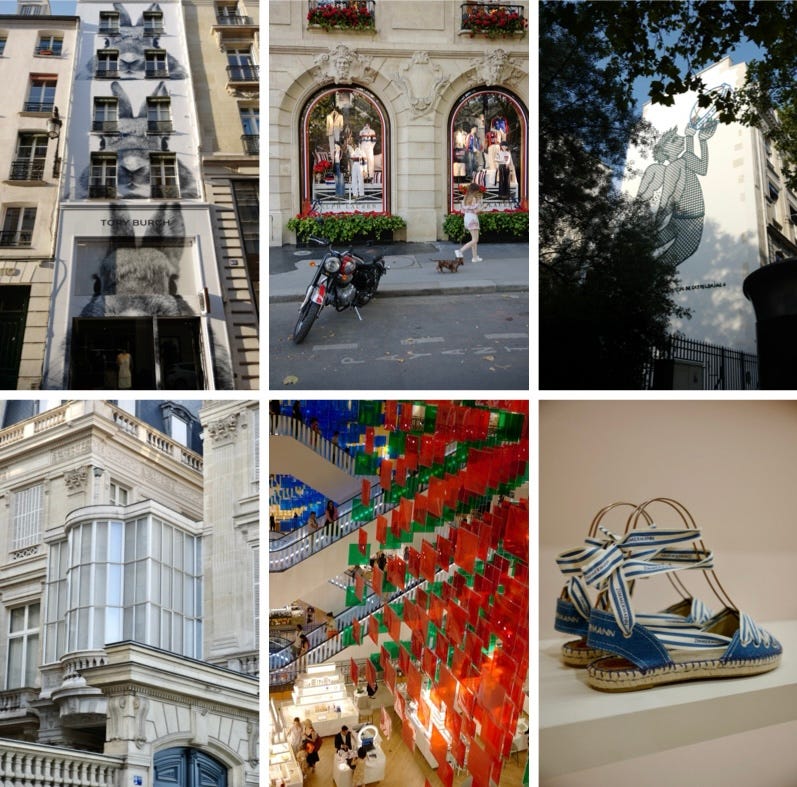
President Macron sure knows how to throw a proper party. Noblesse oblige.
But it is seldom the noblesse that pays for all the fun. It's the shops in central Paris that don't seem to get the hordes of tourists that they were promised. It's the restaurants that you can't get to without a QR code, or without walking a lengthy detour around the red zones that you aren't allowed to cross. It's everyone working in central Paris who is stuck in traffic jams for hours because the roads are blocked and lanes are reserved for Paris 2024.
It's the woman who returns from the market and throws a tantrum because her QR code doesn't work. Once again.
The four policemen at the corner of Rue du Bac and Rue de Lille were laughing and chatting as we approached. They were tanned and cheery, hardly sweating under their bulletproof vests. Their French was melodious, with every e at the end of a word pronounced sharply. Hearing them quip was as if Paris were under a Midi sunset.
"You look confused. Where do you want to go?" He spoke in English with the accent that Americans watching Emily in Paris go wild about.
"La Madeleine," I replied in French. "Where can we cross the river?"
"Use the Passerelle and go through Les Tuileries to Faubourg Sainte-Honoré. It'll take you about 20 minutes, I guess." There was a flicker of mischief in his eyes.
"Or, you can swim across. Like Madame Hidalgo the other day."
"No, thanks. Not yet. I'll wait until Monsieur Le Président goes for his swim in the Seine. He promised."
At that very moment, I imagined Macron among the 110 heads of state during the opening ceremony, Brigitte at his side, dressed in Dior couture. She looks regal. He gets up and starts to strip. Brigitte folds his jacket and pants neatly over the back of his chair. He takes his socks off last. Naked, he strides presidentially towards the river for a skinny dip.
The crowds roar and cheer.
For the emperor's new clothes.
https://www.aestheticnomads.com/
Contributors:
Hans Pauwels, words - Reinhilde Gielen, photographs.
Featured artists:
Man Ray, Daniel Buren, Jean-Charles de Castelbajac, Jonas Wood, Duane Hanson




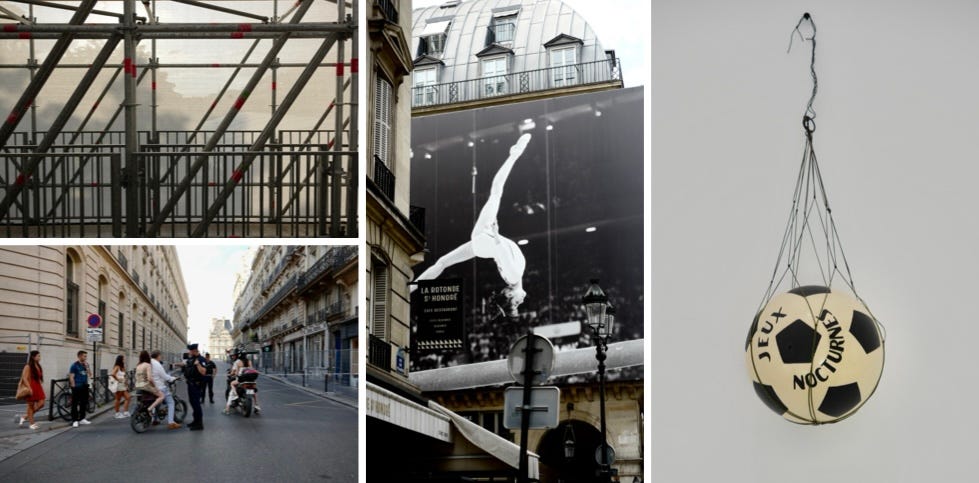
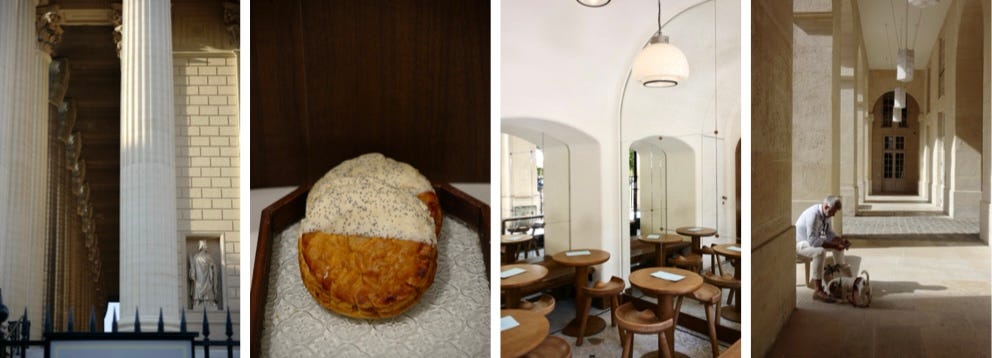


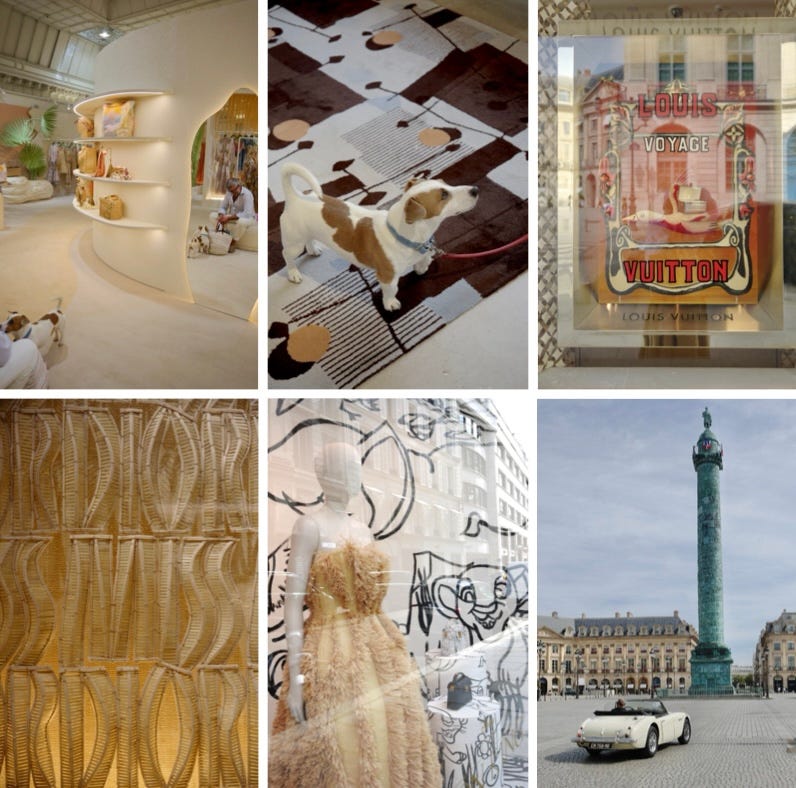

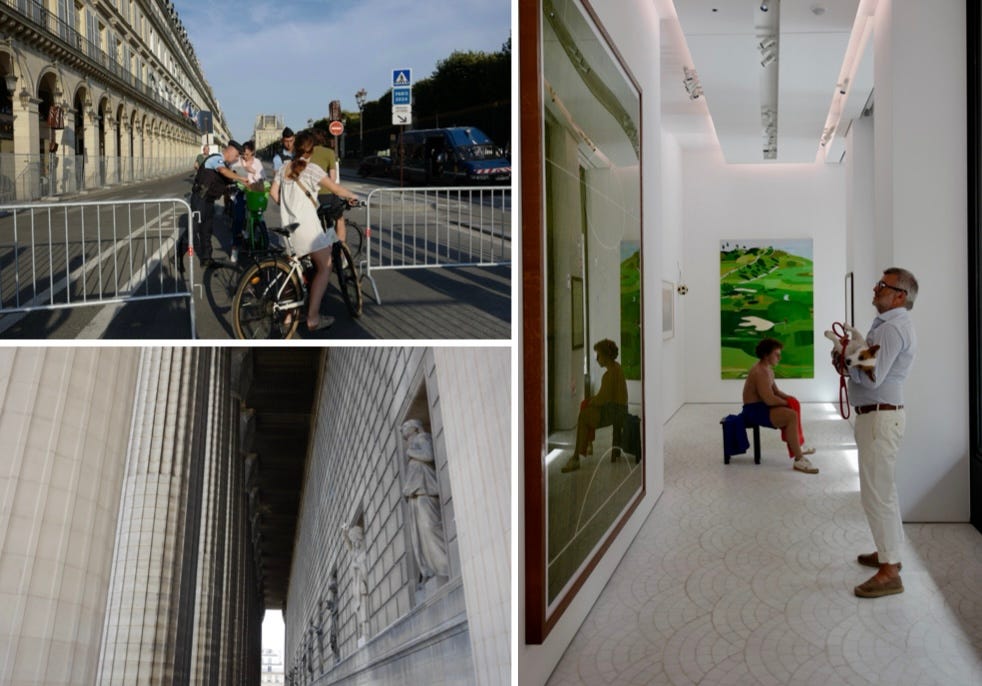
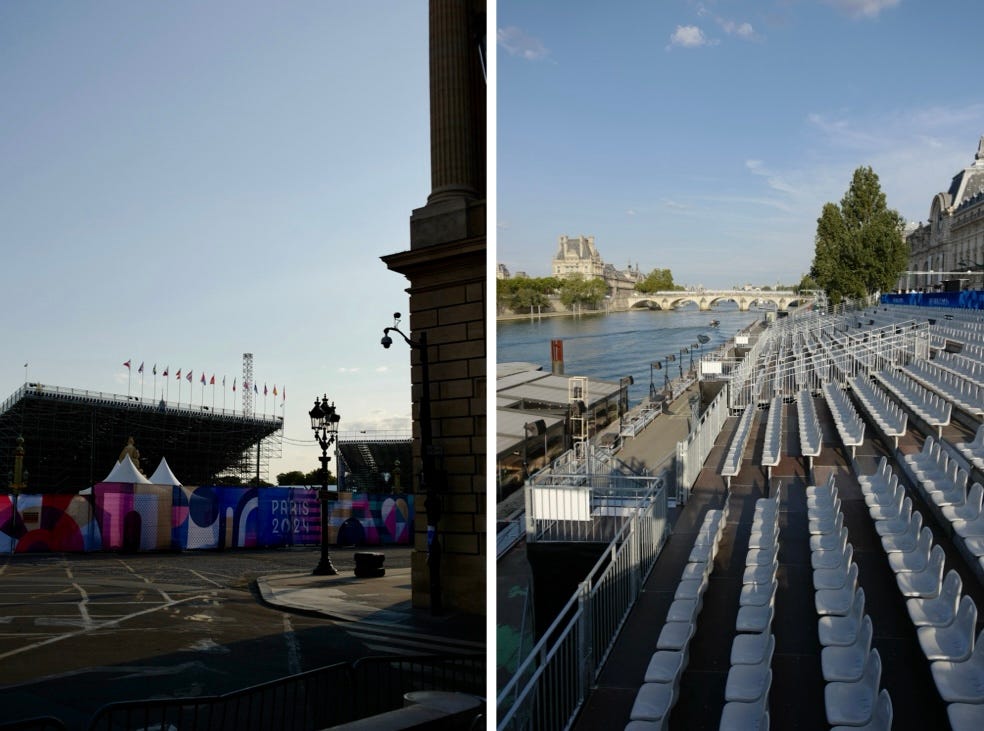
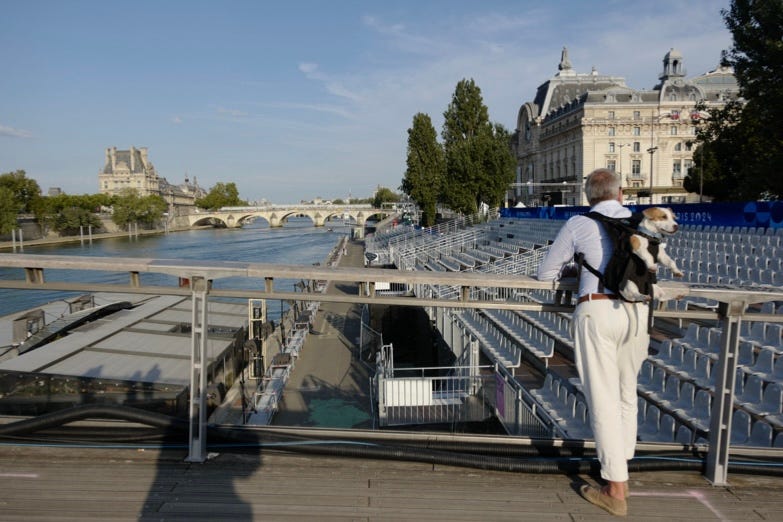
Excellent write-up! Thank you for taking us behind the pre-Olympics scene in Paris.